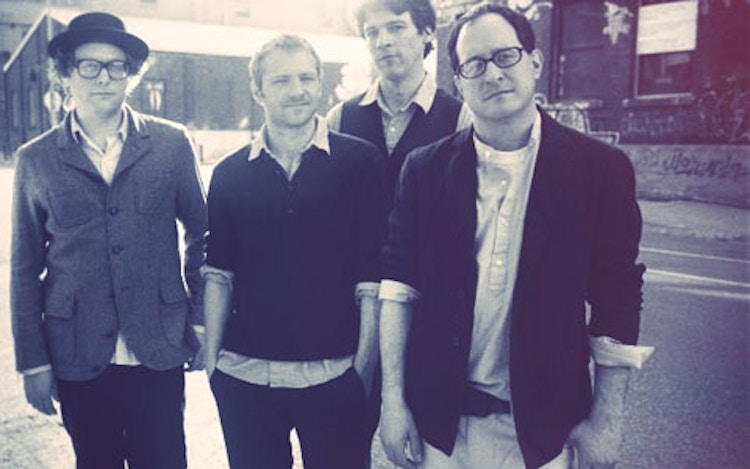"Heaven is Whenever"

The big news preceding The Hold Steady‘s new album, Heaven is Whenever, was keyboardist Franz Nicolay’s departure. For the minutiae-hound fans of a band with a fully-formed aesthetic the question was how it would affect their sound. Nicolay’s often wild organs were an increasingly prominent feature of The Hold Steady’s bar band roar, but his absence on Heaven is Whenever never really plays out in the ways we might have imagined. The big change, if you can call it that, is that the band seems to have shed the last vestiges of punk from its sound. The riffs are still big, but they never come as fast as they did on ‘Constructive Summer’ or ‘Stay Positive.’ Like every Hold Steady album thus far, it’s a little too uneven to feel definitive, but Heaven is Whenever sounds like a truly great brand zeroing in on perfecting its act.
Opener ‘Rock Problems,’ plays a fun seasick game in which woozy verses are buffeted by vicious riffs on the chorus and, coupled with fellow rockers like ‘The Smidge’ and ‘Barely Breathing,’ it establishes the album’s theme of disillusionment with the trappings of rock and roll (but not the music itself). It’s a fine line for a band so obsessed with its youth, but there’s something less immediate. Elsewhere, the manic boogie of second track ‘Our Whole Lives,’ is probably the most danceable song in The Hold Steady catalog and ‘The Sweet Part of the City’ is an experiment in Keith Richards style blues guitar noodling that’s surprisingly enjoyable. ‘Hurricane J’ aims to be Heaven is Whenever‘s big rock single a la ‘Sequestered in Memphis’ or ‘Stuck Between Stations’ and it’s good, but still comes up a little short in comparison. Of course, the album ends with a big closer in the grand tradition of ‘Against the Wind’/‘Purple Rain’/‘Slapped Actress’ but the surprise here is that there are two. Up first is ‘A Slight Discomfort,’ which feels like a fitting and earned end to the past 30 minutes, with its big synth-wash, martial drum fill & horns fade-out as Craig Finn sings, “This won’t hurt/but you might feel a slight discomfort.” That would have been fine, but it’s followed by ‘Soft in the Center,’ which shows the band at its most facile and uninspired. For a band that thrives on the tension between (what we think of as) simple-minded music and extremely self-aware lyrics, lines like “You can’t get every girl” and “I know what you’re going through/I had to go through that too” bring the whole thing precariously close to pastiche.
For most bands, lyrics just aren’t that important, but Finn has always made what he sings matter. He comments on the band’s backward looking music by fusing his own mythology of a teenage fervor for drugs, booze, religion and rock and roll with the same rock sounds he was listening to then and which his band plays today. Just for fun let’s do a little unpacking (with an assist from the fan site Unified Scene’s message boards) of Heaven is Whenever‘s best song, really a Hold Steady all-time classic, ‘We Can Get Together.’ The song broadly is about disillusionment with the world and finding a sort of salvation or at least peace in rock and roll. The chorus goes dreamily, “Heaven is whenever/we can get together/sit on your floor/and listen to your records.” The songs Finn (or his character) grew up listening to sold him ideas about love and heaven and now he doesn’t buy them, but he still loves those songs. The verses are dense and while singing in an almost 50′s ballad style, Finn manages to pile up references to The Ass Pony’s (‘Heaven isn’t Happening,’ likely ‘It’s Not Happening’), Pavement (‘Heaven is a Truck’), Hüsker Dü (‘Girl Who Lives on Heaven Hill,’ ‘Makes No Sense at All’), The Psychedelic Furs (“Heaven is the whole of the heart” from their song ‘Heaven’), Meat Loaf (‘Paradise By The Dashboard Light’) and 70′s prog rock band Utopia (‘Love is the Answer’) as examples. The most interesting part of the song though, is when he gets to Heavenly, the 90′s British twee pop band, and sings “She says Heavenly was cool/I think they were from Oxford/I only had one single/It was a song about a pure and simple love” (a reference to the Heavenly single ‘Our Love is Heavenly’). Heavenly specialized in exaggeratedly innocent and sweet songs and never more so than on ‘Our Love is Heavenly.’ So it makes it all the more poignant when Finn comes around to the bridge, which goes, “He wasn’t just the drummer/he was the singer’s little brother/I still play that single/but it don’t sound that simple.” This is a reference to Heavenly’s drummer Matthew Fletcher (singer Amelia Fletcher’s little brother and the band’s chief songwriter) who killed himself in 1996. Finn is describing a moment in which the ideas of the music that were most important to him (or at least his character) started seeming bankrupt. If the guy who wrote ‘Our Love is Heavenly’ killed himself, then Finn knows that love isn’t saving anyone. But instead of despairing, he turns back to the music itself to take the place of love or religion. This is as neat of an encapsulation of The Hold Steady’s worldview as Finn has ever sung.
At this point, no matter the small shifts in sound, we know what we’re getting from The Hold Steady. And, likewise, the band knows who they are, as evidenced by perfect moments like ‘We Can Get Together.’ This is no longer an experiment in repurposing some of the most outre moments of pop rock; it’s an institution and each album’s success rests on its songs. Rejoice: Heaven is Whenever delivers.
Get the Best Fit take on the week in music direct to your inbox every Friday

Wet Leg
moisturizer

MF Tomlinson
Die To Wake Up From A Dream

BIG SPECIAL
National Average





